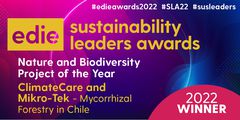The global political landscape has changed significantly since December 2015 when the Paris Agreement was signed by 196 nations at COP21. But politics is only one contributing factor to the success of the Paris Agreement. Christiana Figueres, Former Executive Secretary of the United Nations Framework Convention on Climate Change (UNFCCC), and self-proclaimed “stubborn optimist”, spent time with The Crowd’s latest event in London to share her views on future climate change action.
Corporate climate action: what’s necessary, desirable, and achievable
Under her new Mission 2020 campaign, Christiana is convening a group of leading experts to galvanize urgent climate action over the next three years. The Mission is led by three key words which can help focus corporate strategy:
- Necessary: what the science says
- Desirable: the opportunity for organizations
- Achievable: the cost of action is lower than the cost of inaction
For Christiana, business priorities need an urgent and purposeful paradigm shift: to understand what action makes sense now, and for business continuity in a rapidly changing world. Business must look at the risks, opportunities and value that can be delivered by combining short-term successes with longer term sustainable growth opportunities.
She is excited about the role that technology will play in making carbon reductions increasingly cost effective and achievable. Further, with radical collaboration, she is optimistic about enhancing the speed of innovation and scaling of these technologies. Crossing geographical, corporate, and political boundaries will lead to collective responsibility for a joined-up approach which could transform the existing reality.
Areas of opportunity for business
Collaboration, innovation, and technology within the transport sector has already had a profound effect on global carbon levels. Battery storage, access to wind and solar energy, and the electrification of vehicles and air travel are all examples of the game changers that Christiana gets excited about. But there are several areas that have not yet received enough investment with real opportunity for corporates to get involved:
- Protecting the last remaining primary forests
- Restoring degraded land and addressing intensive desertification
- Adopting sustainable agricultural practices to improve productivity and yields
- Eliminating unsustainable deforestation by 2020
Communities that are most affected by deforestation, land degradation, desertification, and land use changes are often the most vulnerable to climate change. With limited funds, these communities and their governments are prioritizing spend on reacting to climate change, rather than on proactive mitigation and adaptation efforts. Through their climate action programs, business can provide social, economic, and environmental benefits to improve resilience in climate-vulnerable communities, building long term sustainability. The outcomes from these programs can be aligned to the United Nations Sustainable Development Goals (SDGs), creating opportunities for corporates to engage customers, suppliers, consumers, producers, and investors in their action.
Going beyond carbon neutral and the role of environmental instruments
Christiana is a strong advocate of using market-based approaches to help address these challenges. For corporates, purchasing environmental instruments represents a cost-effective and efficient means to reach an emission reduction or renewable energy goal. The financial flows generated through instrument sales go far beyond meeting climate goals to deliver important sustainable development outcomes for communities and biodiversity conservation.
Today we experience climate warnings on virtually a daily basis, through sea ice depletion, coral bleaching, desertification, and intense weather patterns. But hopefully the undaunting energy and optimism of the woman who delivered the Paris Agreement will lead all businesses to scale up their action and make a carbon zero future the reality.
At the event hosted by The Crowd, we asked Christiana for her view on the use of market-based approaches to help corporates meet stretching emission reduction and renewable energy goals faster and smarter. Hear what she had to say below:
Les toutes dernières Insights de
Climate Impact Partners

The ROI of Sustainability
Sustainability is no longer a side initiative; it’s a strategic driver for business performance.
Pour en savoir plus
Three Carbon Projects Driving Community Impact
The best carbon projects don’t just cut carbon, they can restore nature, improve lives and provide new economic opportunities for communities.
Pour en savoir plus
COP30: Carbon Market Insights
Find out about the key updates from COP30 impacting the carbon markets.
Pour en savoir plus















